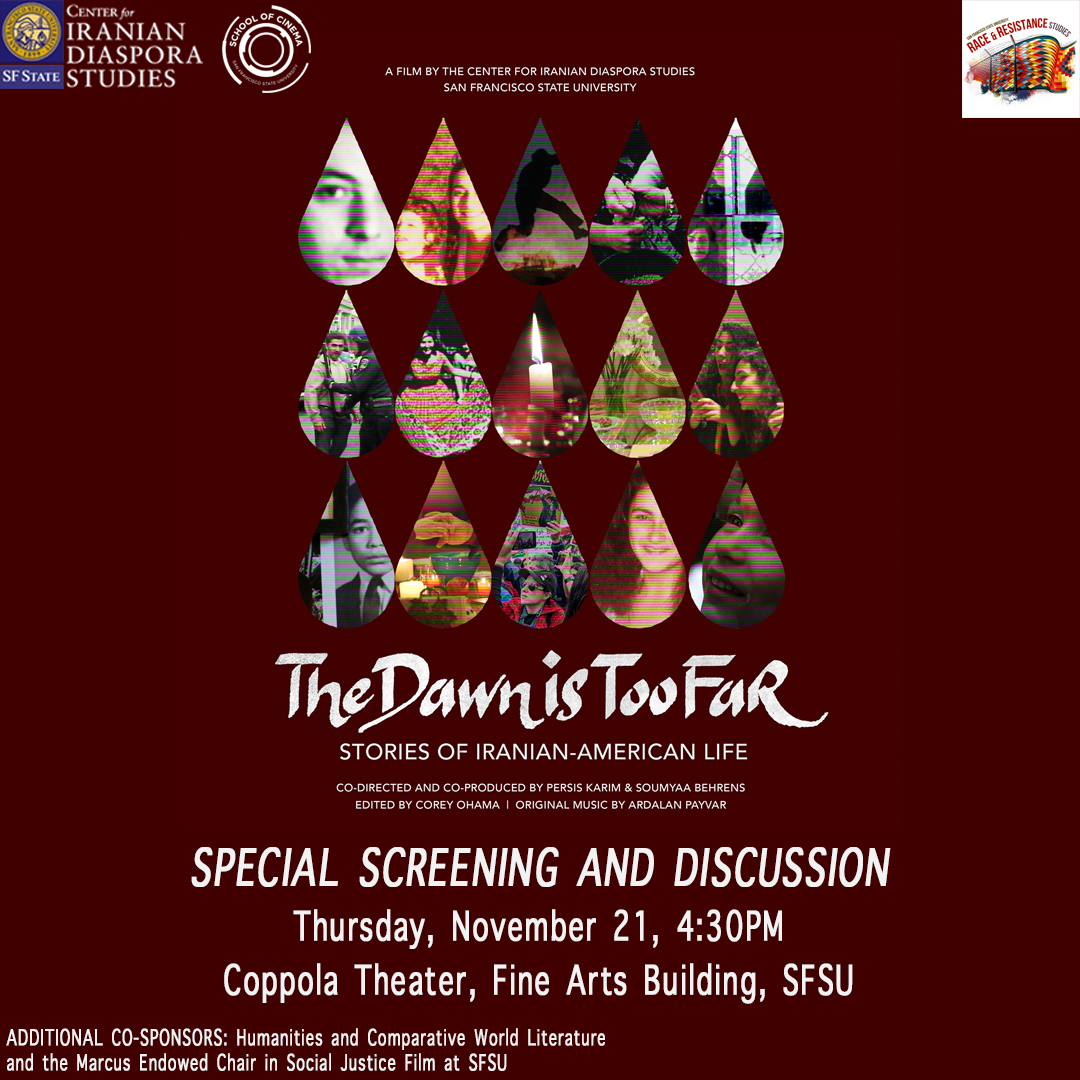
Message from the Chair
Welcome to the new academic year! In this 3rd edition of our newsletter, we have more spotlights on our wonderful students, staff, and faculty, exciting news to share, and information about past and upcoming events. We kicked off this year with a student mixer which was a great success (see more details below)! We continue to be one of the fastest growing departments on campus in terms of our majors and minors and are dedicated to building community with our students and grassroots organizations outside the university.
If you have any events you’d like to see, please reach out to me (bakrania@sfsu.edu) or to our Office Coordinator, Gautam Baksi (gautam@sfsu.edu).
If you'd like to donate to RRS to help us support our students, please donate through our online platform. Thank you!
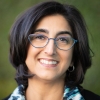
Dr. Falu Bakrania
Spotlights
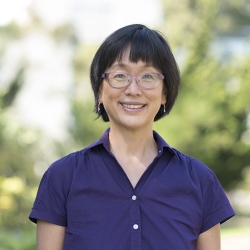
Staff Spotlight
Dr. Grace Yoo
Dean of the College of Ethnic Studies
I was born in Los Angeles. I am the oldest daughter of Korean immigrant parents. I attended UC Irvine and discovered Ethnic Studies in my second year. It changed my life. The classes opened up my eyes to white supremacy and racism. They made me realize that there were so many stories not told. This started my road from self-hate to self-love and to a connection with my ancestors. I went on to get my MPH at Loma Linda in public health and my first job out of college in student affairs at UC Riverside focused on Asian American students.
Ethnic Studies means to me liberation from Eurocentric ways of being and the ability to see the beauty and strengths within yourself and others. When I was taking my Ethnic Studies classes in college, I thought it would be a dream to teach Ethnic Studies. I became an Ethnic Studies teacher because I wanted to bring voice to experiences that went unheard and that were at the margins. I wanted to center those experiences.
The College of Ethnic Studies (COES) was started 56 years ago by SF State students who wanted a curriculum that was relevant and non-Eurocentric. They protested and closed the school down for five months. Four hundred students were arrested and several given prison terms of up to two years.
I have been in COES at SFSU since 1996. I began my journey as a lecturer and would move onto a tenure track position and later serve as Chair and the First Year Experiences faculty director. It has been a labor of love to teach classes, mentor students, lift up communities, and “decolonize.” Ethnic Studies has allowed us to do this. It has been a gift. My role as Dean is to give back to and to lift up students, staff and faculty in our college and to continually advance and support Ethnic Studies at SFSU.
In my down time, I love hiking early in the morning along the coast with my dog and his pack. I am also into eco-sustainable sewing! I learned sewing during the pandemic, and I love making things (e.g. turning bedsheets into skirts) that most folks might trash or send onto Goodwill. My label in the making is “gracecycle.”
A fun fact about me is that in 2001, my family and I wanted to buy a house. We had difficulty entering the housing market and had no money to fix anything. This was hard as we had bought a fixer upper. An SF State professor knowing our predicament asked me what was plan B? Plan B was to get on TV. The SF Chronicle had done a casting call for a home improvement show and over 3000 people entered. Somehow we got picked! The segment of this home improvement show is now on YouTube and has over 10k hits. Remember you too can tile! Enjoy!
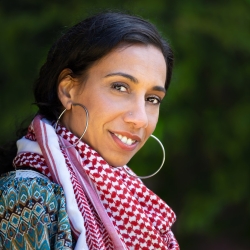
Faculty Spotlight
Dr. Rama Ali Kased
My name is Rama Ali Kased (راما علي قاصد), and I am Palestinian and born and raised in Brooklyn, New York. My parents and siblings were long-time community organizers and defenders of humanity, and they were my first teachers. They instilled in me the importance of believing and striving for change, of being guided by love, and of radically imagining a world free from oppression.
My formal education started in Brooklyn during the heightened policing and militarization of public schools in marginalized communities. I learned early on that schooling should be a liberatory and empowering process and not one of control and demoralization. My college years were spent organizing in student movements and working towards schooling processes that reflected the conditions of students and their needs. As result of my passion to change the schooling systems, I studied political science and philosophy with the goal of becoming a teacher.
I moved to San Francisco over 15 years ago to pursue graduate school. For my graduate work, I drew on critical race theory, critical pedagogy and ethnic studies to study promising practices to create equitable and liberatory education. When I completed my Master’s Degree, I started working at SF State and helped start the Metro College Success Program, an award-winning social justice program for freshman and sophomores at SF State University. Though I am now based in RRS, I am still a faculty advisor for the program.
During my professorship in RRS, I have published articles on community organizing, public health and promising schooling practices. My current research focuses on education equity, the history of Arab communities and movements, and police brutality and its connection with the genocide in Palestine. I also advise students organizations on campus, and work with Doctorate and Master students as they conduct their research and complete their culminative projects.
As an Associate Professor in RRS, I teach introduction courses, courses on racial capitalism, and the senior capstone course. My teaching philosophy aligns with the teachings of Critical Race Theory. Schools are the microcosms of broader society; thus, racism (among other isms) is very much infused in our schools and schooling practices — historically and in the present. I strive to empower my students to be agents of their education and of social change. My framing is also very much aligned with Paulo Freire's work, among others, that illuminates how teaching/pedagogy is never a neutral act but one that either dismantles oppression or reinforces it.
As a long-time community organizer, I have resolved to bring my experiences of collective action and ways to create social change into the classroom. Teaching about power, and ultimately, empowering students is what most excites me. As a professor, I strive to create a safe space for students to explore issues impacting their communities, to connect with other students to build solidarity, to normalize their experiences, and to ultimately realize that change in possible.
Free Palestine.
“We are the ones we've been waiting for."
— June Jordan.
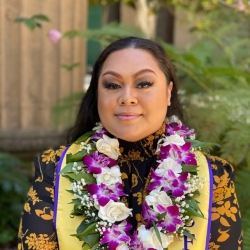
Undergraduate Alumni Spotlight
Arasi Hamilton
Arasi Hamilton (she/her/hers) was born in Seattle, WA, with her lineage tracing back to the villages of Fagatogo and Tula, in American Samoa. She is a community organizer, activist, scholar, and a first-generation college student. Her journey to higher education humbly began at Chabot College in Hayward, CA. She completed an Ethnic Studies A.A. in 2019.
While at Chabot College she was a founder of Nesian’s Unite, a student-led club that aims to create a community and sense of belonging for the Native Hawaiian Pacific Islander (NHPI) populations navigating higher education. Arasi served as Nesian’s Unite’s first Interclub-Council Representative, as well as Chabot’s Student Senate’s Events Coordinator. She also helped organize the largest climate protest, “Rise for Climate” in September of 2018.
Arasi transferred to San Francisco State University in Fall 2019 and graduated in Spring 2021 with her B.A. in RRS and a minor in Critical Pacific Islands and Oceania Studies. After graduating from SFSU, Arasi was called back to Chabot College to serve as Nesians Unite’s Program Coordinator. She oversees the program’s budget, organizes campus and community events, and is a mentor to students. Arasi is also leading the transition of Nesian’s Unite becoming an institutionalized Learning Community at Chabot College. This will be the first Native Hawaiian Pacific Islander Learning Community Program at Chabot College.
Arasi is currently applying to graduate school. She loves to read, hang out with her friends, and travel with her husband.
“I am thankful for all the villages for having a hand in raising me and for continuing to be
sources of light, lessons, and an inspiration.”
— Arasi Hamilton
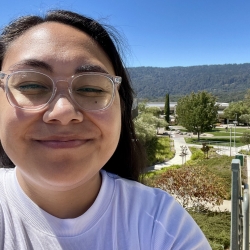
Graduate Alumni Spotlight
Levalasi Loi-On
Levalasi Loi-On is a mixed Samoan educator who learned about the importance of Ethnic Studies and SF State in the high school programs Peer Resources and Pin@y Educational Partnerships. She was supported by Metro and the Pacific Islanders’ Club, and she took Pacific Islander courses at CCSF while she earned her B.A. in History with a minor in RRS. In 2016, she was inspired by students organizing to defend and advance funding for Ethnic Studies and applied for the Ethnic Studies M.A. Program in the College of Ethnic Studies (COES). As an M.A. student, she worked with students and faculty to push for the Critical Pacific Islands and Oceania Studies (CPIOS) minor, while also working with Grace Yoo and Arlene Daus-Magbual in the first Asian American Native American Pacific Islander Serving Institution (AANAPISI) ASPIRE program (now Asian American & Pacific Islander Student Services). She was selected as the Graduate Hood Recipient for her work and research gathering the stories of students and faculty creating Pacific Islander (PI) Studies in San Francisco.
Since then, Levalasi has taught Ethnic Studies / PI Studies at Balboa High School, CCSF, Cañada College, and College of San Mateo. She has collaborated with Dr. Allyson Tintiangco-Cubales, Sarah Wongking Tanuvasa, Kerri Ann Borja, and Dr. Leora Kava to develop PI Studies curricula statewide. In 2022, she and Sarah worked with non-profit organizations, such as the Samoan Community Development Center, to conduct a community-led needs assessment (Kapasa Fetu’u) focused on the needs of Pacific Islander youth and families in San Francisco.
Lasi currently works as the Access, Relevance, Community (ARC) Coordinator in the COES, where she supports transfer students through an AANAPISI-funded initiative in partnership with the San Mateo Community College District. She credits a village of leaders and collaborators that have helped her to honor the Samoan proverb o le ala i le pule le tautua — which translates as the pathway to leadership is through service.
RRS Scholarship Winners
Every year, RRS offers several competitive student scholarships. These include the Edward Said Scholarship and the Queer/Trans Ethnic Studies Undergraduate Scholarship. Last year, for the first time, we were also able to offer two RRS Undergraduate scholarships! These funds help our amazing students achieve even more, in turn helping further our collective mission of creating a socially just world.
We asked last year’s winners to tell us a little bit about their background, their plans, and how the scholarship funds helped them. Here’s what they told us:
Valeria Caridad
I am a fourth-year Race and Resistance major with a minor in Political Science, and I am a first-generation Mexican American student. My RRS major holds deep personal significance as it was during my first semester at SFSU that I decided to switch my major to RRS. I learned how racially and ethnically diverse communities are affected by the topics and behaviors that breed and exacerbate social issues. I was also amazed by the history and fight of RRS at SFSU. My dedication to RRS is fueled by the sacrifices made by my family to offer a better life for me, the pride I have in my heritage, and improving this world for future generations to come. I am studying abroad at the University of Carlos III of Madrid to complete my Political Science minor and provide an international perspective on movements and resistance activity. This scholarship will ease my financial hardships, allowing me to fully immerse myself in my studies and seize opportunities that will further my growth as a leader and advocate. I plan to return to SFSU next semester to complete my degree in the spring.
Lorrina Jimenez
I’m a first-generation college student, a Bay Area native, and a fourth-year student at SFSU. My major is Race and Resistance Studies. My RRS major means a lot to me because from a young age, I have always been passionate about social justice and ethnic studies. RRS has also given me the knowledge to find my self-identity and has opened my eyes to a whole new world. I knew from the beginning that I wanted to apply my RRS knowledge to working within the field of education. The education system isn’t always accessible to students who come from underrepresented communities, and I want to make a difference by providing resources for these students and improving the education system overall. This scholarship has helped me invest in my education by being able to purchase school materials because now I don’t have to stress about not being able to afford them.
Kylie Choi
I am a Chinese, neurodivergent, queer, gender non-conforming, first-generation student who was born and raised in San Francisco on occupied Ramaytush Ohlone land. I am in my fourth year at SFSU, and I am double majoring in Race and Resistance Studies and Studio Art, with a minor in Queer and Trans Ethnic Studies. Being able to major in Race and Resistance Studies and minor in Queer and Trans Ethnic Studies is a valuable opportunity that I am grateful for. Both this major and minor have given me the opportunity to learn about groups of people and communities which have been historically marginalized and silenced, allowing me to further understand the ways in which systems of oppression have been created and upheld in order to maintain hierarchies of power. In pursuing this degree, I hope to attain valuable knowledge and experiences to be able to apply it to a career in art or in teaching with a focus on Ethnic Studies. The funds from the Queer and Trans Ethnic Studies scholarship have helped alleviate some of the stresses that come with being a full-time student while also being an educator part time. Being able to receive this scholarship has helped with paying tuition and offsetting the tuition increase, while also affirming that my dedication and work is recognized and seen as valuable to others.
Katelyn Ross
I am a first-generation college student who enjoys working with youth. I was born and raised in the Bay Area and come from San Leandro. Minoring in RRS has changed my perspectives on U.S. education. This minor helps support how I deliver education to youth. It has made me aware of the different structures set in place to hold students back. As for the future, I plan to continue working with the youth in after-school programs to uplift and empower them through restorative education practices. The scholarship has helped me pay for my Fall 2024 tuition and support buying materials for the school year.
Announcements
News
In Spring 2024, student encampments sprung up across the nation to demand their universities to divest from corporations that are complicit in the genocide in Palestine. The General Union of Palestinian Students and Students for Gaza at SF State University maintained an encampment for three weeks and was the first university to hold public negotiations with administration. By the end of the semester, initial agreements with administration were accepted.
During the summer, the administration, encampment student leadership, and faculty observers joined a working group that investigated the University’s investment portfolio and developed new language that addresses investment policies. As a result of this work, the University has divested from four corporations, including weapons manufacturers Lockheed Martin and Leonardo and the big-data mining companies Palantir and Caterpillar. The University has also drafted new language that will be incorporated into the Investment Policy Statement that institutionalizes this divestment and includes a broader commitment to divest from other corporations that violate human rights. The University has also committed to quarterly publish their investment portfolio on their website.
RRS will be announcing a new round of scholarship applications at the beginning of Spring 2025! We will email eligible students, but in case our list is not complete, make sure to check out the “Scholarships” tab on our website.
Dr. Rama Kased is going into her third year of a grant funded project, “We Got Next”: Enabling Insider Research with Priority Populations to Achieve Tobacco-Related Health Equity. The project brings together scholars from RRS and the University of California San Francisco in conducting research projects on community health.
Dr. Omar Zahzah has published two articles:
- (2024) “Campaign against Project Nimbus Gathers Steam and Supporters.” Text. The Electronic Intifada. August 23.
- (2024) “Meta’s Community Standards as a Tool of Digital/Settler-Colonialism.” The Markaz Review. September 6.
Dr. Zahzah continues to work with the RSCA grant he received in Spring 2024 to work on his book — under contract with The Censored Press in partnership with 7 Stories Press — titled, Terms of Servitude: Zionism, Silicon Valley and Digital/Settler-Colonialism in the Palestinian Liberation Struggle.
Both Dr. Kased and Dr. Zahzah are co-editors with Dr. Loubna Qutami on a forthcoming article:
- Qutami, L., Kased, R. Ali, Zahzah, O. “Introduction to Arab Communities and Movements in the U.S.,” in Foundations and Futures: An Asian American and Pacific Islander Multimedia Textbook. UCLA Asian American Studies Center Press. (forthcoming Winter 2024).
Past Events
On September 18, poet, essayist, and educator Craig Santos Perez gave a presentation and led a discussion on Pacific Islander poetics and climate justice in an event hosted by Professor Leora Kava and students of RRS 275 (Intro to Pacific Islander Literature — How to Read an Ocean). Craig read a series of poems, including selections from his latest collection, Call this Mutiny, in response to quotes from Teresia Teaiwa’s short piece, “To Island.” “To Island” considers what possibilities arise if we think of ourselves as islanded:
Shall we make “island” a verb? As a noun, it’s so vulnerable to impinging forces. Let us turn the energy of the island inside out. Let us ʻislandʻ the world! Let us teach the inhabitants of planet Earth how to behave as if we were all living on islands! For what is Earth but an island in our solar system?
Drawing together themes that arose between his poetry and lines from “To Island,” Craig responded to questions on Pacific Islander poetics and the connections between Pacific Islander storytelling and climate justice. Craig’s presentation and discussion with students emphasized Indigenous Pacific Islander forms of storying connection through poetry, and that poetry — as a means of layering meaning and connection — presents Pacific Islander strategies of ecological consciousness, ethics, and action.
This event was sponsored by the Department of Race and Resistance Studies, the Critical Pacific Islands and Oceania Studies Minor Program, the ARC program, and Climate HQ.
On the afternoon of Thursday, September 19, we held our second student mixer, with food, music, and new swag. Our goals in holding these mixers are to help build community among RRS majors and minors and invite non-majors/minors to learn more about our department. The chair, Dr. Falu Bakrania, welcomed the students, and some of the RRS faculty — Dr. Leora Kava, Dr. Omar Zahzah, Dr. Rama Kased, and Dr. Cesar Rodriguez — introduced themselves to the students and described some of the courses they teach. Gautam Baksi, RRS office coordinator, introduced himself and the kinds of help he offers students. Students also heard presentations from Dr. Grace Yoo (Dean of COES), Kyle Wallace and Bibiana Arriola (advisors), Joseph Adams (Career & Development Leadership Development), Jannet Reyes and Brandon Foley (Associated Students), and from the student organizations GUPS and PISA.
The event was a success! Over 100 students attended, and we later learned from them that they found it informative and really enjoyed getting to know the faculty and other students better.
Upcoming Events
We are excited to launch the Oceania Scholars Program (OSP) at San Francisco State University, funded through a one-time CSU grant to enhance the student achievement program of Asian American, Native Hawaiian, and Pacific Islander (AANHPI) students. This collaborative initiative between the Asian American and Pacific Islander Student Services and Critical Pacific Islander and Oceania Studies (CPIOS) housed in the Department of Race and Resistance Studies (RRS) addresses the unique challenges faced by Native Hawaiian and Pacific Islander (NHPI) students. It focuses on improving retention, fostering student engagement, and increasing graduation rates. The Oceania Scholars Program is an important step in expanding opportunities for NHPI students, reinforcing the university’s commitment to equity and inclusion.
The OSP aims to foster a sense of belonging for NHPI students by offering culturally responsive programming that supports their academic and personal growth. Through a combination of mentorship, student engagement, and community-building efforts, the program ensures that NHPI students remain supported throughout their academic journey, leading to increased retention and graduation rates.
We are particularly thrilled to introduce Tupou Latukefu as the Oceania Scholars Program Coordinator. Tupou will work directly with students, organizing activities that promote engagement, provide mentorship, and connect students with the resources needed to succeed at SF State.
The launch event will feature cultural exhibitions from various Pacific Islands alongside poster presentations and poetry from students enrolled in the Introduction to Pacific Islander Studies course. These presentations will focus on resistance to colonialism and the challenges Pacific Islander students face at SF State, providing insight into how they navigate higher education and celebrate their cultural resilience.
The program’s leadership includes Dr. Ponipate Rokolekutu, Assistant Professor of RRS, serving as the Principal Investigator (PI), and Jeremy Khuth, Director of AANHPI Student Services, serving as the Co-Principal Investigator (Co-PI). Together, they will oversee the program's implementation and ensure its alignment with the overall goals of student success at SF State.
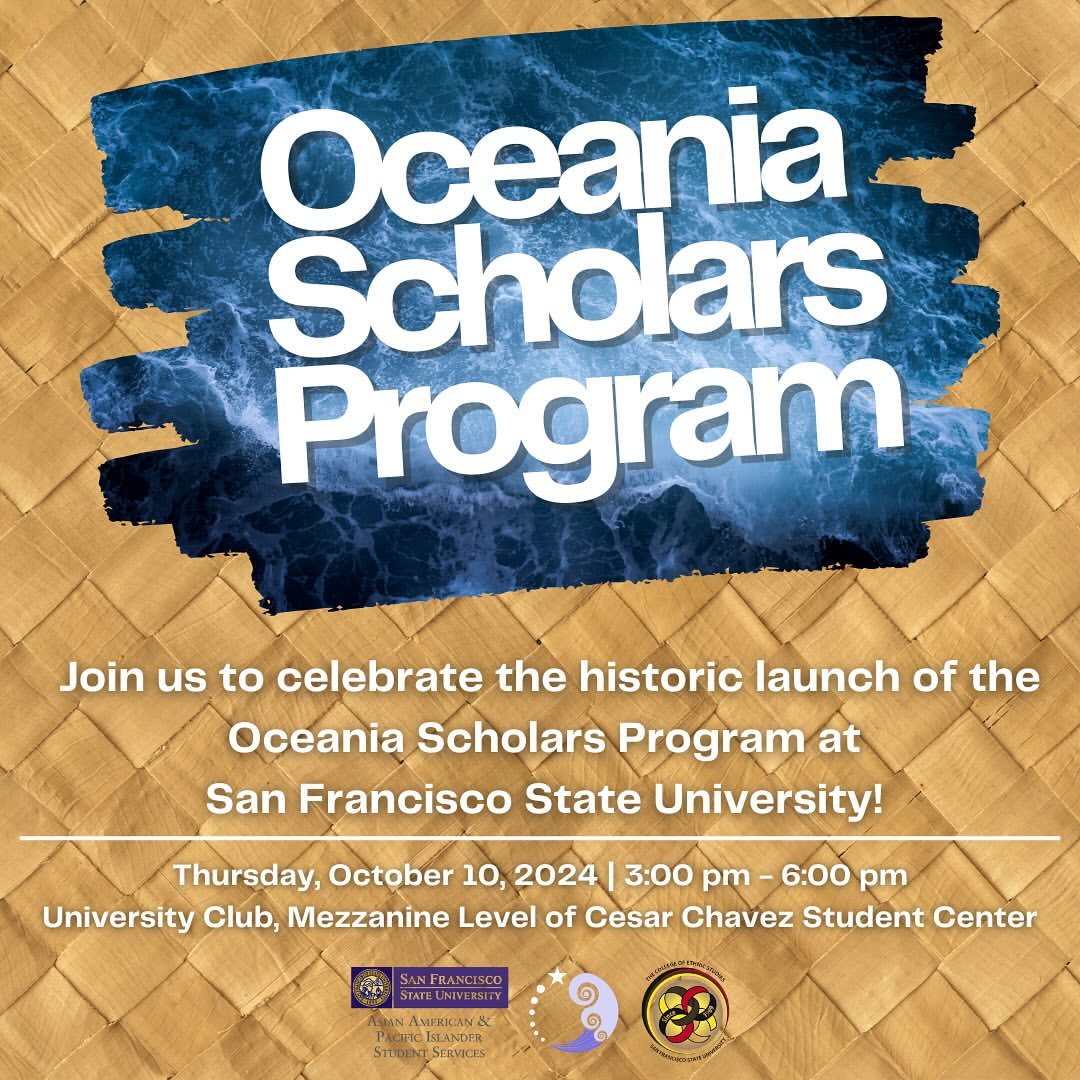
Interested in climate justice and sustainability? Join us on October 24th from 12 p.m. to 2 p.m. at the University Club in Cesar Chavez Center! This event will highlight the Climate Certificate program, providing opportunities for students and faculty to connect and share insights on courses and projects. Network with like-minded peers, enjoy food, and explore how you can be part of the climate action community at SFSU. RSVP required — space is limited to 100 people!
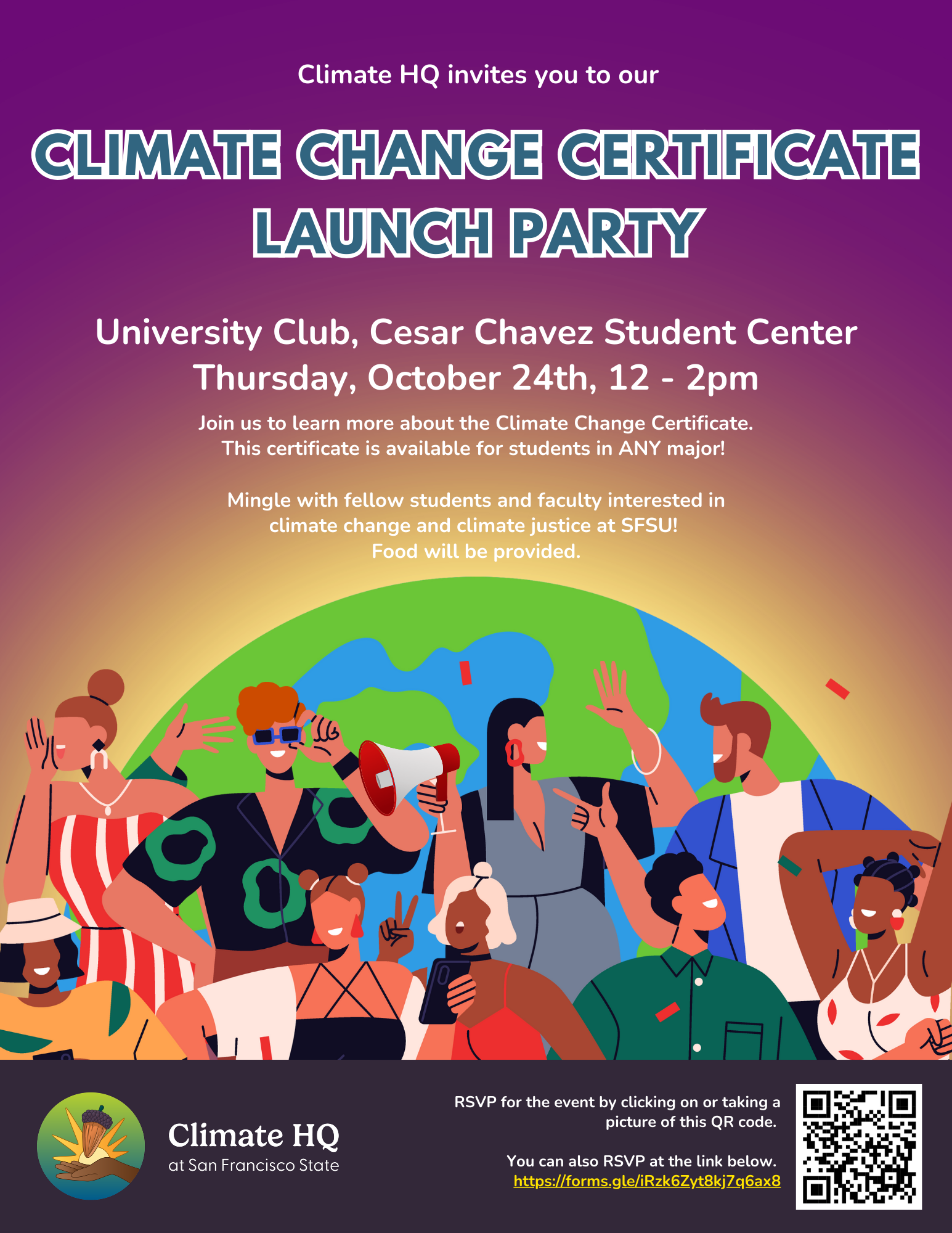
Join us on Thursday, November 21st at 4:30 p.m. (Coppola Theater, Fine Arts Building) for an SF State screening of "The Dawn is Too Far: Stories of Iranian-American Life," a documentary about the Iranian Americans in the San Francisco Bay Area, co-directed by Persis Karim and Soumyaa Behrens (both SF State faculty).
Reception at 4:30 p.m., film screening at 5 p.m.; Q & A to follow.
This event is co-sponsored by the Center for Iranian Diaspora Studies, the Department of Race and Resistance Studies, the School of Cinema, and the Marcus Endowed Chair in Social Justice Film and Humanities and Comparative and World Literature.
